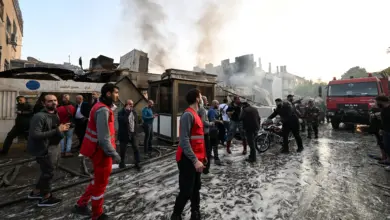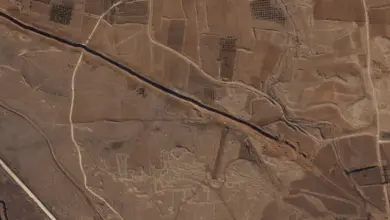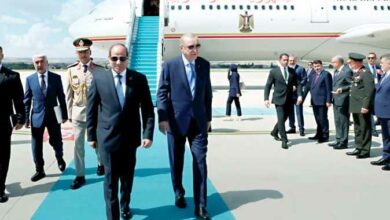AMMAN – Syrian tanks opened fire on poor Sunni districts in Latakia on Tuesday, residents said, the fourth day of a military assault on the northern port city aimed at crushing protests against President Bashar al-Assad.
"Heavy machinegun fire and explosions were hitting al-Raml al-Filistini (home to Palestinian refugees) and al-Shaab this morning. This subsided and now there is the sound of intermittent tank fire," one of the residents, who lives near the two districts, told Reuters by phone.
The Syrian Revolution Coordinating Union, a grassroots activists' group, said six people, including Ahmad Soufi, 22, were killed in Latakia on Monday, bringing the civilian death toll there to 34, including a two-year-old girl.
Assad, from Syria's minority Alawite sect, has broadened a military assault against towns and cities where demonstrators have been demanding his removal since the middle of March.
The crackdown coincided with the 1 August start of the Muslim Ramadan fast, when nightly prayers became the occasion for more protests against 41 years of Baathist party rule.
Syrian forces have already stormed Hama, scene of a 1982 massacre by the military, the eastern city of Deir al-Zor, and several northwestern towns in a province bordering Turkey.
Turkish Foreign Minister Ahmet Davutoglu told Assad to halt such military operations now or face unspecified consequences.
"This is our final word to the Syrian authorities, our first expectation is that these operations stop immediately and unconditionally," Davutoglu said in Turkey's strongest warning yet to its once close ally and neighbor.
"If these operations do not stop, there will be nothing left to say about the steps that would be taken," he told a news conference in Ankara, without elaborating.
Turkish leaders, who have repeatedly urged Assad to end violence and pursue reforms, have grown frustrated. Davutoglu held talks with the Syrian leader in Damascus only last week.
The Syrian Revolution Coordinating Union said troops also assaulted villages in the Houla Plain north of the city of Homs on Monday, killing eight people as they raided houses and made arrests. The organization said four people were killed in Homs during similar attacks.
FAMILIAR PATTERN
In a now-familiar pattern, tanks and armored vehicles deployed around dissident neighborhoods of Latakia and essential services were cut before security forces began raids, arrests and bombardment, residents said.
"People are trying to flee but they cannot leave Latakia because it is besieged. The best they can do is to move from one area to another within the city," another witness said on Monday.
Thousands of people fled a Palestinian refugee camp in Latakia, some fleeing gunfire and others leaving on orders from the Syrian authorities, a UN official said.
"Between 5000 and 10,000 have fled, we don't know where these people are so it's very worrying," said Christopher Gunness, spokesman for the UNRWA agency which cares for Palestinian refugees. "We have a handful of confirmed deaths and nearly 20 injured."
The Palestinian presidency in the West Bank city of Ramallah urged Damascus to safeguard the lives of Palestinian refugees in al-Raml camp in Latakia.
Another grassroots activist group, the Local Coordination Committees, said it had the names of at least 260 civilians, including 14 women and two infants, killed this month.
It said the actual toll was likely to be far higher with scant information so far from the hard-hit city of Hama, still besieged by troops and secret police.
Syria has expelled most independent media since the unrest began, making it hard to verify reports from the country.
Navy ships shelled southern parts of Latakia on Sunday, residents and rights groups said.
Nightly anti-Assad rallies after Ramadan prayers have drawn around 20,000 people in different areas of the city, said one witness, a university student.
The official state news agency SANA denied Latakia had been shelled from the sea and said two police and four unidentified armed men were killed when security forces pursued "armed men who were terrorizing residents…and using machineguns and explosives from rooftops and from behind barricades."
The US State Department said on Monday it was unable to confirm that the Syrian navy had shelled Latakia.
"However, we are able to confirm that there is amour in the city and that there is firing on innocents again in the pattern of carnage that you have seen in other places," State Department spokeswoman Victoria Nuland.
ALAWITE ELEMENT
Unlike most Syrian cities, which are mainly Sunni, Latakia has a large Alawite population, partly because Assad and his father before him encouraged Alawites to move from their nearby mountain region by offering them cheap land and jobs in the public sector and security apparatus.
Latakia port has played a key role in the Assad family's domination of the economy, with Bashar al-Assad's late uncle Jamil having been in virtual control of the facility, and a new generation of family members and their friends taking over.
Assad replaced the governor of the northern province of Aleppo, SANA reported, after pro-democracy protests spread to the provincial capital, Syria's main commercial hub.
"The minority regime is playing with fire. We are coming to a point where the people in the street would rather take any weapon they can put their hand on and fight than be shot at or arrested and humiliated," said one activist.
"We are seeing civil war in Syria, but it is one-sided. The hope is for street protests and international pressure to bring down the regime before it kills more Syrians and drives them to take up arms," he added, asking not to be named.
Rights groups say at least 12,000 have been detained during the uprising. Thousands of political prisoners were already in jail. Amnesty International says it has listed 1700 civilians killed since mid-March. Washington has put the toll at 2000. Damascus says 500 police and soldiers have been killed.
The assaults by Syrian security forces have drawn increasing condemnation from the West, Turkey and more recently from Arab countries such as Saudi Arabia and Jordan.
Washington wants Europe and China to consider sanctions on Syria's vital oil and gas industry. Germany called for more European Union sanctions against Syria on Monday and urged the UN Security Council to discuss the crackdown again this week.




